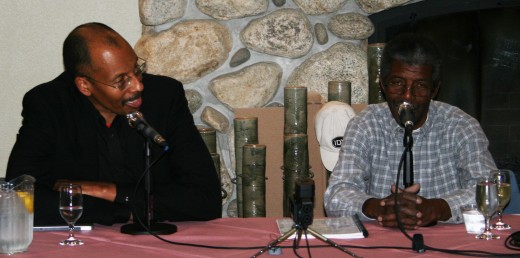
Photo by Marshall Smith
Marshall Hawkins has played with some of the greatest names in jazz. He has taught at Idyllwild Arts for 30 years. He tells the story of jazz by loving its place in world music as a distinctly American art form, born in the black community. He tells the story of jazz by loving the individuality of his students and by helping each find his or her individual voice. He tells the story because, as he sees it, jazz is love.
On an alumni weekend devoted to honoring Hawkins, jazz pianist and motivational speaker Harry Pickens interviewed him about his youth, the challenges he faced growing up in the Washington, D.C. area and how he became a musician. And, just as he has done for years with his students, Hawkins told the story.
Pickens asked how the weekend had affected him. “It’s been pretty amazing what has happened this weekend,” said Hawkins. “I’m overwhelmed.” Pickens remarked about a quality that characterizes Hawkins. “It’s your quality of presence,” he noted. “You are always there.”
Asked about when his connection to music began, Hawkins answered. “I’d like to start with divine intervention. I was adopted but I had the opportunity to interact with both my biological and my adoptive parents. My mother loved opera. There was always music in the house — Nat Cole, Duke Ellington, Puccini, Bach and Beethoven. I played organ in church but I always had this love for the bass. I’d be walking and always hearing the bass line.”
Then Hawkins spoke of an unexpected detour he said framed his life and helped set his course. “I want to talk about 1954 and Brown v. Board of Education,” he said. Brown was the landmark Supreme Court decision that declared state laws establishing separate public schools for black and white students to be unconstitutional. Hawkins related that in his home of Anacostia, in the southeast corner of Washington, D.C., at 15, he was suddenly one of few blacks in a school of whites.
“My Italian basketball coach lived next door to my cousins. I had not really known about racism before this. But at the beginning [with integration], 20 white students would stand arm in arm to protect us black students from being beaten. Over time, and especially when I started playing organ for school assemblies, everything changed. Music changed everything.”
Hawkins noted how Frederick Douglas was a model for him, a model for integrity, for justice and for doing good. “He was an idol for me. I began to focus on all that was good in my life.”
And much was good in his life. Hawkins had natural talent and grace both as a musician and an athlete. And D.C. was, at that time, rich with talent — Roberta Flack, Donny Hathaway, Quentin Warren and especially Shirley Horn. “Shirley Horn was the one who picked me up and launched me into the universe,” said Hawkins. “She had this unbelievable harmonic way. She taught me how to dig deep into my own creativity. She always taught me it was ‘the music,’ about the music, not yourself.”
And it was Horn who, at a later juncture in Hawkins’ young career, gave a recommendation to Miles Davis that led to Hawkins joining Davis for a year. “Yes, he can play your music,” Horn had said to Davis when Davis’ bass player could not continue.
The jazz greats with whom Hawkins has played include so many, but it is his influence as a teacher that is his prized legacy — a legacy that will always live through his students, many of whom have gone on to major careers in jazz.
Asked Pickens, “How would you describe your legacy here at Idyllwild Arts?” Hawkins paused and then answered quietly, “It started with this music being the American heritage and my responsibility to pass it on. It’s a gift from God and it’s so important to pass it on. You can’t teach jazz. It has to be on its own. All it takes to play this music is heart and to be cognizant of how important this music is.”
Hawkins said he doesn’t teach to create professional musicians. He teaches from love. “I look forward every day to being mentored by these students. This music belongs to everyone.”
And with that, everyone in the room stood. Pickens moved to the piano and played “More Than You Know” — slowly, gently and movingly. The opening lyric is “More than you know, more than you know, man of my heart I love you so.”
And better than anyone could have expressed, the song summed up the weekend. For an iconic musician, for a gracious and esteemed teacher who loves jazz, loves to tell the story and teaches through love, how appropriate it was to have that love and honor returned — to Marshall Hawkins, a gentleman of jazz who gives and loves so much.










